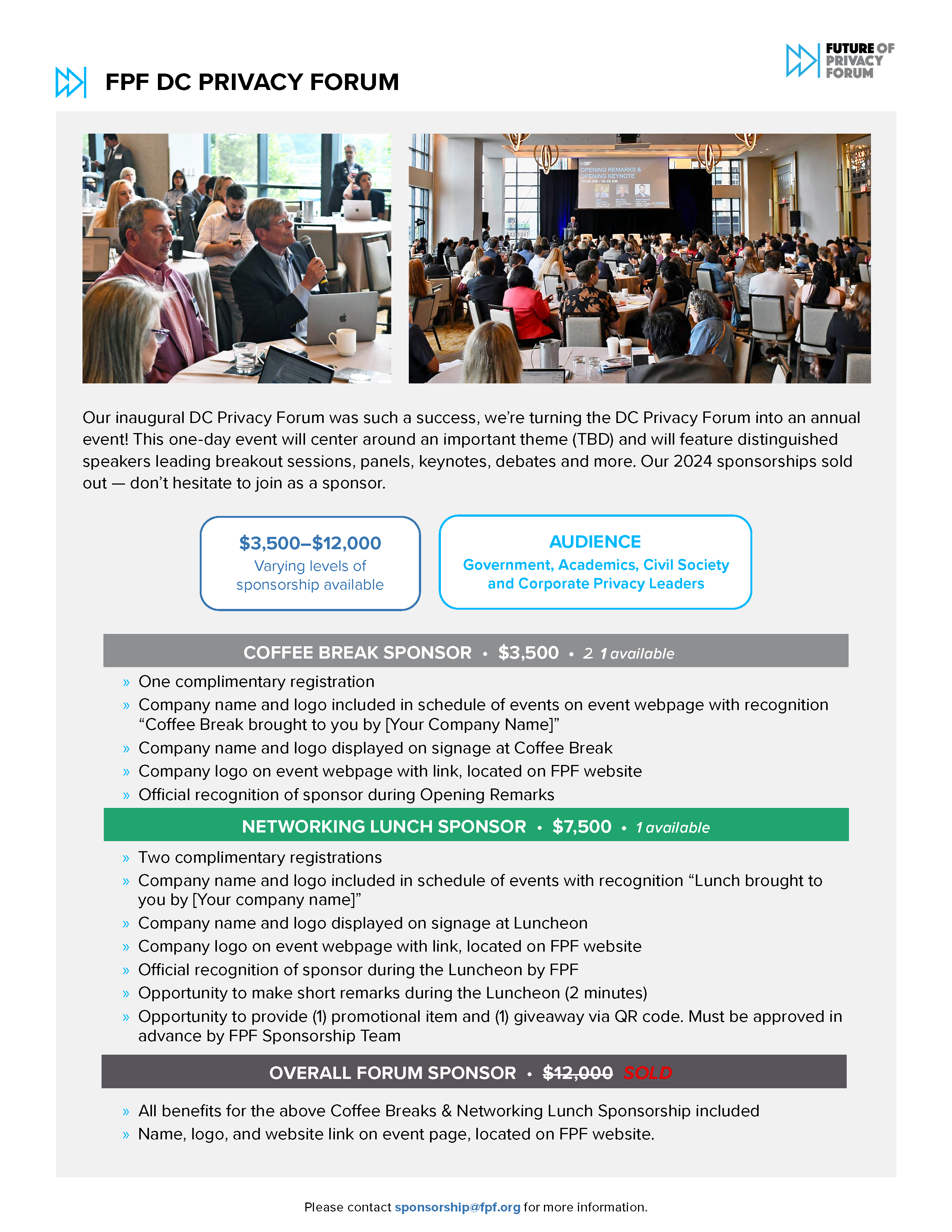9:00 am –
10:00 am ET
|
WELCOME COFFEE & EVENT REGISTRATION
|
|
10:00 am –
10:45 am ET
|
OPENING REMARKS & OPENING KEYNOTE
From a technically focused standards-setting agency to the home of the new U.S. AI Safety Institute, NIST is playing a central role in the national strategy for advancing responsible uses of AI. The newly appointed Safety Institute Chief Vision Officer will provide an overview of the new Institute’s priorities and path forward.
|
Welcome Remarks
- Jules Polonetsky, CEO, Future of Privacy Forum
- Alan Raul, Board Chair, Future of Privacy Forum
Keynote Remarks
- Adam Russell, Chief Vision Officer, U.S. Artificial Intelligence Safety Institute, NIST
|
10:45 am –
11:15 am ET
|
AI TALKS
Talk 1: Youth & Education
FPF’s Director of Youth and Education Privacy, David Sallay, will discuss some of the trends related to AI use by kids and teens, including a deep dive into the recently released report and checklist “Vetting Generative AI Tools for Use in Schools.”
Following David, Colleen’s talk will present Pew Research Center survey findings related to youth, privacy, and AI largely focusing on the views and experiences of U.S. teenagers. It will also touch on U.S. adults’ views on related topics.
|
Moderator
- David Sallay, Director for Youth & Education Privacy, Future of Privacy Forum
Speaker
- Colleen McClain, Research Associate, PEW Research Center
|
11:15 am –
11:30 am ET
|
BREAK
|
|
11:30 am –
12:00 pm ET
|
RISK ASSESSMENTS: UP TO THE TASK?
Legislative mandates and emerging standards for AI are heavily dependent on effective Risk Assessment processes, but the development of assessments that can fully address the vast range of AI risks and relevant mitigations is still a moving target. The effective intersection of AI assessments and data protection assessments continues to be a priority, as is the importance of scaling assessments that can be impactful globally while addressing sector-specific issues. Our panel of Senior Privacy and AI executives will explore a range of topics that risk assessments can consider including the ethical implications of AI decision-making, and will explore the challenges of ensuring transparency and accountability in AI-driven risk management processes and internal governance practices.
|
Moderator
- Anne J Flanagan, Vice President for AI, Future of Privacy Forum
Speakers
- Ed Britan, Senior Vice President, Global Privacy & Marketing Legal, Salesforce
- Barbara Cosgrove, Vice President, Chief Privacy Officer, Workday
- Katherine Fick, Associate General Counsel, IBM
|
12:00 pm –
12:30 pm ET
|
AI TALKS
Talk 2: Is Algorithmic Fairness Even Possible?
Princeton Professor Arvind Narayanan, author of “AI Snake Oil”, will discuss his upcoming book and his scholarship on fairness and machine learning.
|
Moderator
- Agnes Bundy Scanlon, Board Member, Future of Privacy Forum
Speaker
- Arvind Narayanan, Professor of Computer Science, Princeton University
|
12:30 pm –
1:00 pm ET
|
AI & THE FUTURE OF WORK
AI is already having a significant impact on recruiting, hiring, assessing and promoting employees. A leading member of the EEOC will join FPF staff to discuss concerns of bias and discrimination, as well as the potential of AI-driven tools for fostering inclusive workplaces. This panel will also review FPF’s updated Generative AI for Organizational Use checklist.
|
Moderator
- Adonne Washington, Policy Counsel: Data, Mobility, Location, Future of Privacy Forum
Speakers
- Keith Sonderling, Commissioner, U.S. Equal Employment Opportunity Commission (EEOC)
- Lael Bellamy, Partner, DLA Piper
|
1:00 pm –
2:15 pm ET
|
LUNCH NETWORKING
|
|
2:15 pm –
2:45 pm ET
|
GLOBAL CONVERGENCE & HYPERLOCAL REGULATION
Topic 1:
- AI Legislation: States to the Rescue?
A leading state legislator and FPF’s state AI legislation lead will discuss the perspectives and priorities that local legislators are bringing to state-level AI regulation.
Topic 2:
- Global Convergence or Competition for Regulatory Leadership”
Are we seeing a “Brussels Effect” or an “Alliance of Democracies” as countries move rapidly to establish new laws, AI Safety Institutes, and global agreements? Is GDPR and data protection the actual AI regulator in Europe and beyond? How is trade and the race for AI leadership shaping developments?
|
Moderators
- Tatiana Rice, Deputy Director for U.S. Legislation, Future of Privacy Forum
- Lee Matheson, Senior Counsel for Global Privacy, Future of Privacy Forum
Speakers
- Del. Michelle Maldonado, D-VA, 2024 Virginia House of Delegates Communications, Technology, and Innovation Committee
- Senator Robert Rodriguez, Majority Leader, Colorado General Assembly
- Anupam Chander, Scott K. Ginsburg Professor of Law and Technology, Georgetown University Law Center
|
2:45 pm –
3:30 pm ET
|
THE AI DEBATES
This debate-style format will include audience engagement via real-time votes throughout the discussions from each viewpoint to side one way or the other.
- Data Minimization – Resolved: Data minimization is compatible with the development of artificial intelligence.
- U.S. Legislation – Resolved: APRA Strikes the Right Balance For the Future.
|
Data Minimization Debators
- Omer Tene, Partner, Goodwin Procter LLP (Opposed)
- Samir Jain, Vice President of Policy, CDT (In Favor)
U.S. Legislation Speakers
- Jennifer Huddleston, Senior Fellow in Technology Policy, Cato Institute (Opposed)
- Cameron Kerry, Ann R. and Andrew H. Tisch Distinguished Visiting Fellow, Brookings Institute (In Favor)
|
3:30 pm –
3:45 pm ET
|
BREAK
|
|
3:45 pm –
4:15 pm ET
|
KEYNOTE RIVERSIDE CHAT
The key role the FTC is playing in enforcing consumer protection standards to help prevent AI harms.
|
Moderator
- Stacey Gray, Senior Director U.S. Policy, Future of Privacy Forum
Speaker
- Sam Levine, Director, Bureau of Consumer Protection, Federal Trade Commission
|
4:15 pm –
4:45 pm ET
|
FPF WORK STREAM LIGHTNING TALKS
Lightning Topics
- AI + XR
- AI + Cyber
- APAC GeN AI
- EU – Guidance of DPAs on GDPR and AI
|
- Jameson Spivack, Senior Policy Analyst for Immersive Technologies, Future of Privacy Forum
- Jim Siegl, Senior Technologist Youth & Education Privacy, Future of Privacy Forum
- Josh Lee, Managing APAC Director, Future of Privacy Forum
- Christina Michelakaki, Policy Counsel for Global Privacy, Future of Privacy Forum
|
4:45 pm –
5:00 pm ET
|
CLOSING REMARKS
|
- Anne J Flanagan, Vice President for Artificial Intelligence, Future of Privacy Forum
|
5:00 pm –
8:30 pm ET
|
EVENING AWARDS & 15th ANNIVERSARY DINNER RECEPTION
Join us for an unforgettable evening as we commemorate a significant milestone in the FPF journey – our 15th anniversary! This special occasion holds even greater significance as we come together to honor the remarkable tenure of our esteemed Board Chair, Christopher Wolf, who is stepping down after 15 years of dedicated service.
As we reflect on the achievements and milestones of the past decade and a half, we invite you to join us for an evening of celebration, appreciation, and camaraderie. Our networking dinner promises to be an opportunity to connect with colleagues, partners, and industry peers while enjoying exquisite cuisine and lively conversation.
During the event, we will take a moment to express our heartfelt gratitude to Christopher Wolf for his invaluable leadership, vision, and unwavering commitment to guiding FPF to success.
Join us as we raise a toast to 15 years of excellence and bid farewell to a true visionary. Together, let’s celebrate the past, embrace the present, and look forward to a future filled with continued growth, innovation, and success.
|
- Dale Skivington, Board Member, Future of Privacy Forum
- Alan Raul, Board Chair, Future of Privacy Forum
- Christopher Wolf, Founder, Future of Privacy Forum
|
8:30 pm –
10:00 pm ET
|
15th Annual Advisory Board Meeting
Closed sessions kick-off for FPF’s Named Advisory Board members (by invite-only).
June 5 from 8:30 – 10:00pm – After Hours Networking
June 6 from 9:00 am – 10:00 pm – Day 1 of Annual Meeting program.
June 7 from 9:00 am – 12:30 pm – Day 2 of Annual Meeting program.
|
Click here to see the detailed agenda. Note that this site is password-protected. All invitees will have received the password in their invitation emails.
|



